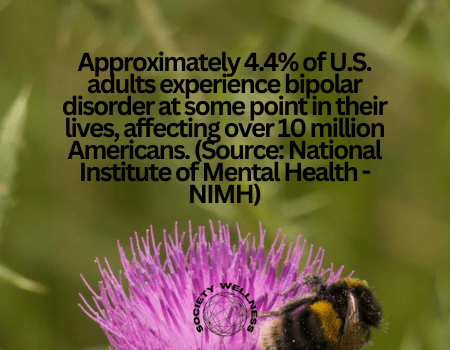Bipolar disorder is a complex mental health condition that affects millions of people worldwide. It is characterized by extreme mood swings, ranging from emotional highs (mania or hypomania) to debilitating lows (depression). These intense shifts in mood can significantly impact relationships, work, and overall quality of life. For LGBTQ+ individuals, managing bipolar disorder can be even more challenging due to unique stressors such as discrimination, stigma, and a lack of inclusive healthcare options.
LGBTQ-centered treatment programs are designed to address both the clinical aspects of bipolar disorder and the identity-specific challenges faced by LGBTQ+ individuals. By providing affirming care, these programs create a safe space for individuals to navigate their mental health journey and achieve long-term stability.
At LGBTQ Addiction Centers, we offer a range of specialized services, including LGBTQ Partial Hospitalization Treatment, LGBTQ Bipolar Disorder Treatment Program, and LGBTQ Mental Health Programs, to support individuals in managing bipolar disorder effectively.
What is Bipolar Disorder?
Bipolar disorder is a mood disorder that causes significant changes in mood, energy, and activity levels. These changes can range from periods of intense euphoria and high energy (mania) to episodes of deep sadness and fatigue (depression). The condition is divided into different types based on the severity and frequency of mood episodes:
Types of Bipolar Disorder:
- Bipolar I Disorder:
- Characterized by at least one manic episode that may be preceded or followed by depressive episodes.
- Manic episodes often require hospitalization due to their severity.
- Bipolar II Disorder:
- Defined by a pattern of depressive episodes and hypomanic episodes, which are less severe than full mania.
- Individuals with Bipolar II often experience longer periods of depression.
- Cyclothymic Disorder:
- Involves chronic mood fluctuations that include hypomanic and depressive symptoms but don’t meet the criteria for full episodes.
- Symptoms persist for at least two years.
- Other Specified or Unspecified Bipolar Disorders:
- Includes cases where symptoms don’t fit neatly into the above categories but still cause significant impairment.
For LGBTQ+ individuals, the challenges of living with bipolar disorder are often compounded by external pressures, such as discrimination and minority stress, making specialized, affirming care critical.
Unique Challenges Faced by LGBTQ+ Individuals with Bipolar Disorder
1. Discrimination and Stigma
- Impact on Mental Health: Discrimination in personal, professional, and healthcare settings can exacerbate feelings of isolation and shame, intensifying bipolar symptoms.
- Barrier to Treatment: Fear of judgment often prevents LGBTQ+ individuals from seeking help, leading to untreated or poorly managed bipolar disorder.
2. Minority Stress
- Definition: The chronic stress experienced by individuals belonging to marginalized groups.
- Effect: Minority stress contributes to emotional instability, often acting as a trigger for manic or depressive episodes.
3. Family Rejection
- Impact on Emotional Well-Being: Rejection by family members due to sexual orientation or gender identity can lead to feelings of abandonment, compounding the challenges of managing bipolar disorder.
- Connection to Treatment: Family rejection often limits access to emotional and financial support, making it harder to seek care.
4. Co-Occurring Conditions
- Increased Risk: LGBTQ+ individuals are more likely to experience co-occurring mental health conditions, such as anxiety, PTSD, or substance use disorders.
- Need for Integrated Care: Addressing these co-occurring issues is essential for effective management of bipolar disorder.
5. Healthcare Discrimination
- Access Issues: Fear of discrimination in traditional healthcare settings can prevent LGBTQ+ individuals from accessing timely and appropriate treatment.
- Importance of Affirming Care: LGBTQ-centered programs eliminate this barrier by providing culturally competent and inclusive care.
The Importance of LGBTQ-Centered Treatment
LGBTQ mental health treatment provides a holistic approach to managing bipolar disorder by addressing both clinical symptoms and identity-related challenges. These programs create a safe, affirming environment where individuals can explore their mental health without fear of judgment or discrimination.
Key Benefits of LGBTQ-Centered Care:
- Affirming Environment:
- LGBTQ-centered programs foster a sense of safety and acceptance, allowing individuals to fully engage in their treatment.
- Therapists and clinicians are trained in LGBTQ+ issues, ensuring culturally competent care.
- Integrated Treatment:
- Programs address co-occurring conditions, such as substance use disorders, anxiety, or PTSD, alongside bipolar disorder.
- This comprehensive approach improves overall outcomes.
- Community Connection:
- Group therapy and peer-led sessions create opportunities for connection and mutual support among LGBTQ+ individuals facing similar challenges.
- Identity-Specific Support:
- Treatment plans are tailored to address unique stressors, such as minority stress, coming out, and navigating gender identity.
Evidence-Based Therapies in LGBTQ-Centered Bipolar Disorder Treatment
Effective management of bipolar disorder requires a combination of evidence-based therapies, medication, and holistic support. LGBTQ-centered programs integrate these treatments within a framework of affirming care.
1. Cognitive Behavioral Therapy (CBT)
- Focuses on identifying and changing negative thought patterns that contribute to mood instability.
- Helps individuals develop healthier coping strategies and challenge internalized stigma.
2. Dialectical Behavior Therapy (DBT)
- Combines emotion regulation, mindfulness, and distress tolerance techniques.
- Reduces impulsivity during manic episodes and promotes emotional stability during depressive episodes.
3. Medication Management
- Mood stabilizers, antipsychotics, and antidepressants are commonly used to manage bipolar symptoms.
- LGBTQ-centered care ensures medication plans are personalized and monitored closely for effectiveness.
4. Trauma-Focused Therapy
- Addresses the impact of past traumas, such as abuse or rejection, on current mental health.
- Builds resilience and reduces triggers linked to mood episodes.
5. Family Therapy
- Educates family members about bipolar disorder and its impact on LGBTQ+ individuals.
- Encourages supportive dynamics and rebuilds strained relationships.
6. Mindfulness and Stress Reduction
- Techniques such as yoga, meditation, and deep breathing help individuals manage stress and prevent mood episode triggers.

Specialized LGBTQ-Centered Programs for Bipolar Disorder
At LGBTQ Addiction Centers, we offer a range of programs tailored to the needs of LGBTQ+ individuals:
LGBTQ Partial Hospitalization Treatment (PHP)
- Provides intensive, structured care for individuals experiencing severe symptoms.
- Includes therapy, skill-building sessions, and medical monitoring in a supportive environment.
LGBTQ Intensive Outpatient Program (IOP)
- Offers flexible treatment for individuals transitioning from inpatient care or managing moderate symptoms.
- Focuses on therapy, coping strategies, and relapse prevention.
LGBTQ Outpatient Treatment Program (OP)
- Provides long-term support for managing bipolar disorder while balancing work, school, or other responsibilities.
- Includes regular counseling and peer support.
LGBTQ Bipolar Disorder Treatment Program
- Tailored specifically to address the symptoms of bipolar disorder and the identity-specific challenges faced by LGBTQ+ individuals.
- Integrates evidence-based therapies with affirming care for comprehensive support.
Long-Term Benefits of LGBTQ-Centered Care
- Improved Symptom Management: Comprehensive care helps stabilize mood swings and prevent relapse.
- Greater Treatment Adherence: Affirming environments encourage individuals to stay engaged in their treatment plans.
- Enhanced Quality of Life: Holistic support empowers individuals to rebuild relationships, pursue goals, and live authentically.
- Stronger Community Connections: Group therapy and peer networks reduce feelings of isolation and foster mutual support.
Conclusion
Living with bipolar disorder as an LGBTQ+ individual comes with unique challenges, but affirming, inclusive care can make all the difference. LGBTQ addiction treatment programs provide the specialized support needed to navigate mental health challenges while embracing one’s authentic self.
At LGBTQ Addiction Centers, we are dedicated to helping individuals manage bipolar disorder and build fulfilling lives. Our programs, including LGBTQ Partial Hospitalization Treatment, LGBTQ Bipolar Disorder Treatment Program, and LGBTQ Mental Health Programs, offer compassionate, comprehensive care tailored to your unique needs.
If you or a loved one is seeking support for bipolar disorder, contact us today at (888)964-8116 to learn more about our services and take the first step toward healing and empowerment. Together, we can help you achieve lasting stability and live authentically.
FAQ on Bipolar Disorder with LGBTQ
Why is bipolar disorder more challenging for LGBTQ+ individuals?
LGBTQ+ individuals often face unique challenges such as discrimination, minority stress, and family rejection, which can intensify the symptoms of bipolar disorder.
What are LGBTQ-centered treatment programs?
LGBTQ-centered treatment programs are specialized mental health services designed to provide affirming, culturally competent care that addresses both mental health symptoms and identity-specific challenges.
How can LGBTQ-centered treatment help with bipolar disorder?
These programs combine evidence-based therapies, medication management, and peer support in a safe and affirming environment to help individuals manage mood swings and improve their quality of life.
What treatment options are available for LGBTQ+ individuals with bipolar disorder?
Treatment options include LGBTQ Partial Hospitalization Treatment, LGBTQ Intensive Outpatient Programs, LGBTQ Outpatient Treatment Programs, and LGBTQ Bipolar Disorder Treatment Programs.
What therapies are effective for bipolar disorder?
Effective therapies include Cognitive Behavioral Therapy (CBT), Dialectical Behavior Therapy (DBT), Trauma-Focused Therapy, and mindfulness techniques. These approaches help manage mood swings and improve emotional regulation.
How do LGBTQ-centered programs address co-occurring conditions?
These programs provide integrated care for co-occurring conditions such as anxiety, PTSD, and substance use disorders, ensuring comprehensive support for overall mental health.
How can I access LGBTQ-centered care for bipolar disorder?
Contact LGBTQ Addiction Centers to learn more about their specialized programs and start your journey toward managing bipolar disorder in a supportive, affirming environment.

